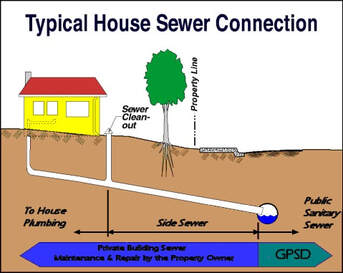Frequently Asked Questions (FAQs)
What service do you provide?
GPSD collects and cleans domestic and industrial wastewater to protect public health from waterborne diseases and viruses. We are not involved with trash pickup. GPSD’s service is limited to wastewater/sewage.
How to I Start or Stop GPSD Service?
What should I do if sewage is backing up into my house or building?
CALL US FIRST! If there is blockage in the sewer main, GPSD will take immediate action to remove the obstruction.
Click here to report a Sewer Emergency.
Click here to report a Sewer Emergency.
What is a lateral sewer pipe and who is responsible for maintaining it?

A lateral sewer pipe connects your home/building to the sewer owned and maintained by GPSD. It serves to move wastewater into the sewer main. Problems related to lateral pipes are the homeowner’s responsibility. Homeowners experiencing slow drainage or complete blockage may have tree roots, grease, baby wipes, etc.; lodged in the lateral sewer pipe. GPSD employees can determine if problems are located in the lateral sewer or GPSD sewer and recommend what you should do.
If neighbors are having similar slow drainage, there is a chance that there is a problem in the public main. If the problem appears to be limited to your home, there may be a problem with the lateral sewer pipe. Remember to call GPSD first, before calling a plumber.
If neighbors are having similar slow drainage, there is a chance that there is a problem in the public main. If the problem appears to be limited to your home, there may be a problem with the lateral sewer pipe. Remember to call GPSD first, before calling a plumber.
Can I pour oil, gasoline, paint thinner, or antifreeze down my drains?
NO! Do not ever dispose of these chemicals down the drains. These materials may cause explosions and disruption of the treatment process. Please follow proper local regulations for disposal.
What causes blockages in the sewer system?
Most sewer blockages occur because the pipe is plugged with an obstruction. Backups can be caused by several factors including the condition of the sanitary sewer system itself; natural phenomena such as earth movement and heavy rainfall; and the incorrect usage of the system by the public. Items such as grease, diapers, baby wipes, sanitary wipes, and feminine products can plug up sewers. These items belong in the trash and should never be flushed in the sewer.
How do I pay my GPSD invoice?
Several payment options are available to customers. Click here for payment options.
Can I receive adjustments for filling my swimming pool, watering my lawn, or if I had a water leak?
Depending on the circumstances, you may be eligible for a credit adjustment. Click here for more information.
Does GPSD send bills to my renters/tenants?
No, it is the policy of the District to send user charge bills only to the record owner of the real estate, except that the Executive Director shall have the authority to make reasonable exceptions to this policy.
What are the City of Peoria Sewer Charges and Peoria Sewer Rehabilitation fees that are included in my GPSD user charge bill?
GPSD collects these fees on behalf of the City of Peoria through an intergovernmental agreement. The City of Peoria Sewer Charge represents the City of Peoria’s cost to maintain sanitary sewers for those customers connected to a City of Peoria owned sewer. Peoria Sewer Rehabilitation represents the cost to improve sewers owned by the City of Peoria. All City of Peoria residents pay this fee. The Peoria City Council sets rates for both of these fees.
How is my user charge bill calculated?
The amount of your sewer bill is determined by water consumption. GPSD obtains this data from the appropriate water company and calculates your bill using various rate factors.
Is GPSD affiliated with the City of Peoria or Peoria County government?
No, GPSD is a standalone non-profit municipal corporation. However, our Board of Trustees is appointed to three-year terms by members of the Peoria County Board.